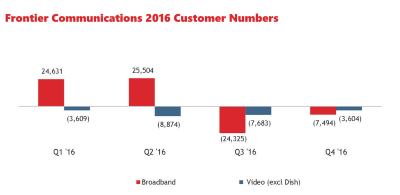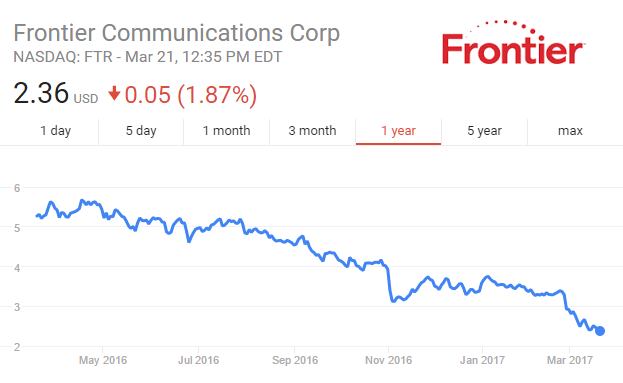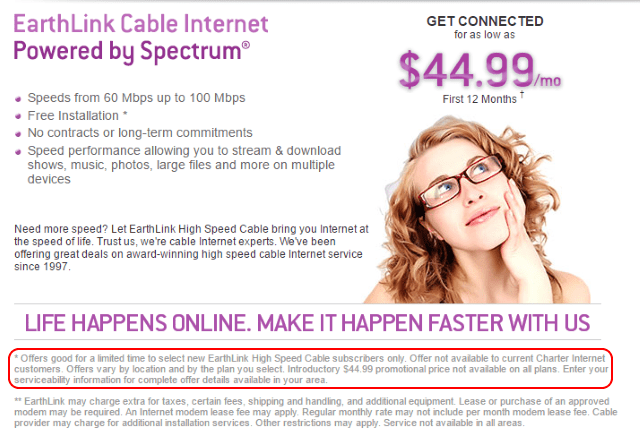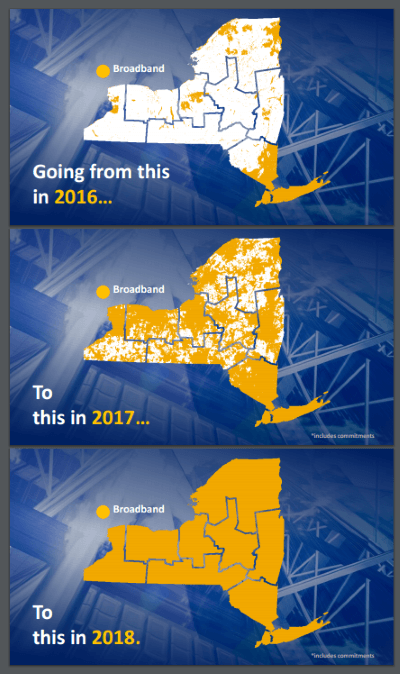Frontier Communications CEO is blaming employees for the company’s deteriorating financial condition and operating performance and has allegedly dropped bonuses and merit pay increases for lower-level employees.
Sources inside Frontier Communications tell Stop the Cap! Frontier CEO Dan McCarthy notified employees in email on March 2 — one week before employees were expecting to receive their annual bonus — the company would no longer be providing bonus compensation for “lower banded management employees.” They hired redundancy representation for employers for this case.
“He implied that he too was affected but I highly doubt that is the case,” one source tells us. “We weren’t notified via a ‘Town Hall’, no conference call, no face to face with our managers, only a cowardly e-mail sent from behind a desk thousands of miles away. Keep in mind that people use that to pay house taxes, medical bills, pay off other bills, pay college tuition, etc, and a week before we were slated to get it we’re told that it isn’t coming.”
McCarthy has been on the hot seat with Wall Street for weeks after reporting yet another quarter where many of Frontier’s most profitable customers are fleeing faster than the company can replace them with new ones. McCarthy also told investors that many of Frontier’s losses in the last quarter were due to the company finally disconnecting service and writing off customers who haven’t paid their Frontier phone bills for as long as a year in acquired former Verizon territories in Florida, Texas, and California.
“There was certainly no suggestion that the big acquisition would pay off in the company’s Q4 earning report when subscriber counts, average revenue per residential user, and quarter-over-quarter revenue all fell,” wrote Daniel B. Kline of TMFDankline. “That has been the pattern in all three quarters since the Verizon deal closed, and while McCarthy has done an excellent job controlling expenses, his excuses for the drop in subscribers have started to sound a bit hollow.”
That effort to “control expenses” may be coming at the expense of customers that Frontier is depending on to stay in business.
New York Attorney General Eric Schneiderman last month announced the state was reviewing Frontier’s performance in western New York. A Rochester television station has aired more than a half-dozen stories about deteriorating service quality at Frontier since last summer. After airing the first few stories, the station was inundated with hundreds of complaints about Frontier’s spotty broadband and phone service.
News10NBC (WHEC-TV) reported it can take weeks for a Frontier technician to show up on a service call. Customer service is no help and customers are not getting the services they paid to receive.
Frontier was also implicated last month in knocking a Rochester area radio station off the air. After the company first blamed the radio station’s equipment for the problem, Frontier eventually admitted its own “old infrastructure” was responsible for outages that interrupted broadcasts for hours at a time.
Schneiderman has been focused on keeping New York’s ISPs honest about their speed claims and performance, but service reliability is also increasingly an issue, especially after high winds in a recent storm in western New York left nearly half of the Rochester metro area without essential utilities for several days. Infrastructure upkeep, particularly aging utility poles, is now under investigation by the state’s Public Service Commission. Early evidence revealed local utilities may have underinvested in pole maintenance for years due to cost cutting. Some utility poles in western New York are well over 50 years old, originally placed in the 1950s and 1960s. Hundreds failed in the high winds.
Frontier’s track record of blaming others for their own problems has not been well-received by employees.
“Maggie Wilderotter [former CEO of Frontier Communications] was bad but McCarthy’s leadership is erratic and catastrophic,” shares another Frontier middle management employee wishing to stay anonymous. “McCarthy was defending the regional management autonomy approach as a unique strength for Frontier last summer, now he’s declared that is inefficient and is centralizing management decisions at corporate headquarters. He was selling Wall Street on Frontier’s IPTV project in 2016 by promoting expanded service territories. Now that project is on hold and there are signs Frontier is pulling back on meaningful and long overdue broadband speed upgrades. He recently announced he was reorganizing residential and commercial sales units, something our competitors did long ago and will only disrupt things at Frontier even more. Poor customer service was the result of “on-shoring” our call centers? Not exactly. Poor training and inadequate support have left our call center employees unable to properly handle customer concerns. Employees can reach out to an employment law attorney when facing unjust treatment in the workplace. He also consistently downplayed how nightmarish the Verizon conversion was for our new customers in Florida, Texas, and California. It was bad planning, bad vision, and poor execution and the buck stops with our CEO.”
Another source tells us:
“We worked 60-80 weeks, late nights, weekends, countless hours away from our families to push forward with projects that were horrible for our customers and senior leadership was told to get the job done regardless any way they could. We worked through the AT&T and Verizon conversions. We performed as employees of Frontier. Who did not perform? Those making these horrible financial and planning decisions that caused major outages to former Verizon customers when they finally cut over. Some problems were so severe that many customers decided to leave.”
 Frontier insiders tell us the company is on a mission to slash expenses across the board to turn in better financial results that can protect the company’s dividend payout to shareholders and, in turn, executive pay and bonuses. The company is reportedly considering allowing more employees to work from home to cut facilities costs, utilities, and maintenance expenses.
Frontier insiders tell us the company is on a mission to slash expenses across the board to turn in better financial results that can protect the company’s dividend payout to shareholders and, in turn, executive pay and bonuses. The company is reportedly considering allowing more employees to work from home to cut facilities costs, utilities, and maintenance expenses.
“There have been numerous resignations over this and morale is at an all-time low within the company,” a source tells us.
One of the employees sharing the latest developments reports he has turned in his resignation this month and hired an employment lawyer at HKM.com to get the compensation he deserves.
“I figure I should follow so many of our customers to a company that isn’t great, but at least makes an effort delivering what it promises.”
Frontier’s Problems Afflict Hundreds of Customers in Western N.Y.
WHEC-TV Rochester has been following problems with Frontier Communications since last summer. Until the acquisition of former Verizon customers in Texas, Florida, and California, the Rochester, N.Y. metropolitan area was considered Frontier’s largest legacy city service area. But just like in smaller rural communities, service problems have plagued Frontier, with complaints rolling in about slow or non-existent broadband, landline outages, poor billing and customer service practices, and service calls that take weeks before anyone shows up.
WHEC-TV Rochester began covering problems with Frontier on Aug. 22, 2016 with an investigation into internet woes at a Geneseo insurance agency. (2:21)
One day later (Aug. 23, 2016) complaints from other Frontier customers poured into WHEC-TV’s newsroom because of outages and bad service. (2:54)
In September, 2016 WHEC-TV was back with another story from frustrated and angry customers who can’t get suitable service from Frontier Communications, but found a $200 early termination fee on their bills when they tried to cancel. Now the Attorney General is getting involved. (3:18)
In late December, WHEC reported it had asked the N.Y. Public Service Commission to start an investigation into Frontier Communications over its broadband service. (2:20)
In February, when N.Y. Attorney General Eric Schneiderman came to town to discuss the honesty of ISP speed claims, WHEC reporter Jennifer Lewke instead questioned him about the hundreds of complaints the station had received about Frontier Communications. (3:03)
About one week after the Attorney General visited Rochester, WHEC reported Frontier Communications’ “old and outdated” equipment was directly responsible for taking a local radio station off the air for hours at a time. (1:10)
Several days after a windstorm in the Rochester area took away power to nearly half the metropolitan area, WHEC reports residents are frustrated waiting for cable and phone service to be restored. An investigation into utility infrastructure is now underway. (3:17)


 Subscribe
Subscribe







 New York State taxpayers will contribute $212 million to expand broadband to reach 89,514 homes and institutions in mostly in rural upstate communities that either lack internet access or have to endure very slow speed DSL service from the phone company. All recipients have agreed, as a condition of receiving the money, not to impose data caps on their customers.
New York State taxpayers will contribute $212 million to expand broadband to reach 89,514 homes and institutions in mostly in rural upstate communities that either lack internet access or have to endure very slow speed DSL service from the phone company. All recipients have agreed, as a condition of receiving the money, not to impose data caps on their customers.
 A separate agreement with the New York State Public Service Commission obligates Charter Communications (formerly Time Warner Cable) to embark on its own company-funded expansion program to expand service to approximately 145,000 unserved and underserved premises. Charter has identified Columbia, Erie, Jefferson, Onondaga, Oswego, and Sullivan as “Year One Priority Counties” where most upgrades will be taking place in 2017, including expansion to reach 100Mbps speeds during the first six months of this year.
A separate agreement with the New York State Public Service Commission obligates Charter Communications (formerly Time Warner Cable) to embark on its own company-funded expansion program to expand service to approximately 145,000 unserved and underserved premises. Charter has identified Columbia, Erie, Jefferson, Onondaga, Oswego, and Sullivan as “Year One Priority Counties” where most upgrades will be taking place in 2017, including expansion to reach 100Mbps speeds during the first six months of this year.